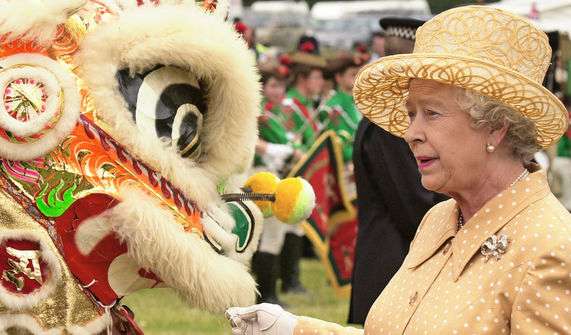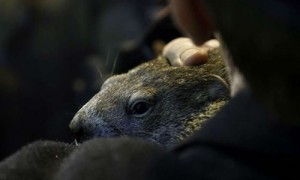导读:中国春节日益成为一个全球性节日,每年不少外国政要都会送上节日祝福、许多外国城市也会举行农历新年庆祝活动,不少中国人认为这是软实力提升的一种表现,并为之高兴,但是这是否只是因为中国经济政治影响力提高,外国为从中国捞好处而阿谀奉承呢?

RED lanterns adorn the aisles of a small supermarket. There are stacks of red envelopes on sale, for stuffing cash in and handing out as gifts. A sign offers seasonal discounts. such festive trappings are ubiquitous in China in the build-up to the lunar New Year, which this year starts on January 28th. But this is Yangon, the capital of Myanmar, where Han Chinese are a mere 2.5% of the country’s population. They are a sign that Chinese New Year is becoming a global holiday.
大红灯笼点缀着一家小超市的过道。店里有成堆的红包出售,用来装入现金,作为礼物送给别人。店里还挂出了季节性打折的标识。在准备农历新年(1月28日开始)的时候,这样的节日景象在中国随处可见。但是这里是仰光,是缅甸的首都,汉族人口只占该国人口的2.5%。这一切都表明,中国新年正在逐渐成为一个全球性的节日。
Several countries in Asia celebrate the lunar New Year in their own way. But dragon and lion dances in Chinatowns the world over have helped to make China’s the most famous. These days growing numbers of people who are not of Chinese descent are joining in. In Tokyo window cleaners dress up as the animals of the Chinese zodiac. Barcelona’s Chinese parade includes dracs (a Catalan species of dragon). America, Canada and New Zealand have issued commemorative stamps for the year of the chicken. Last year New York City made the lunar New Year a school holiday for the first time.
亚洲的几个国家都会以自己的方式来庆祝农历新年。但是世界各地唐人街里的舞龙舞狮表演却让中国的新年最为著名。越来越多没有中国血统的人加入到了这一场盛事中来。在东京,窗户清洁工们打扮成了中国十二生肖的模样。巴塞罗那的华人游行里加入了dracs(加泰罗尼亚种龙)。美国、加拿大和新西兰也发行了鸡年纪念邮票。去年,纽约第一次把农历新年定为一个学校假期。
The spread of the spring festival, as China calls it, is partly due to recent emigration from China: 9.5m Chinese people have moved abroad since 1978, many of them far richer than earlier waves of migrants. It also reflects the wealth and globe-trotting ambitions of China’s new middle class: festivities in other countries are partly aimed at the 6m Chinese who are expected to spend their weeklong holiday abroad this year. International brands are trying to lure these big spenders with chicken-themed items.
春节的传播要部分归功于最近从中国来的移民:自从1978年以来,已有950万中国人移居海外,他们中许多人都要比早期移民富得多。这也反映了中国新兴中产阶级的财富和全球野心:其他国家之所以会举行庆祝活动,是因为他们把目光瞄准了今年会在国外过春节的600万中国人。国际大牌也试图用以鸡为主题的商品来吸引这些大主顾。
Conscious of China’s growing economic and political clout, foreign leaders have taken to noting the occasion. Britain’s Prime Minister, Theresa May, has given a video address, a tradition started in 2014 by her predecessor, David Cameron. Last year the country’s royal family tweeted a picture of Queen Elizabeth dotting the eye of a Chinese lion-dancer’s costume. Also in 2016, Venezuela’s culture minister admitted that his country was celebrating Chinese new year for the first time—with six weeks of festivities—in a bid to improve economic ties with China. It is rumored that this year’s World Economic Forum in Davos was held a week earlier than usual to avoid clashing with Chinese New Year.
由于意识到中国日益增长的经济和政治影响力,许多外国领导人也开始注意到了这一场合。英国首相特丽莎·梅用一份视频讲话向全球华人拜了年,这是一项始于前任首相卡梅伦的传统。去年,英国皇室在推特上发了一张女王伊丽莎白给中国舞狮狮头画眼睛的照片。同样在2016年,委内瑞拉文化部长承认,为改善和中国的经济关系,他的国家第一次庆祝了中国新年,举行了为期6周的庆祝活动。有传言称,今年的达沃斯世界经济之所以比往常提前一周举行,就是为了避免和中国新年撞车。
China hopes the festival will boost its cultural “soft power” abroad. So it sponsors related events, such as a display this year of martial arts in Cyprus and a traditional Chinese temple-fair in Harare, Zimbabwe. It may give Chinese officials satisfaction to see foreigners enjoy such festivities. They lament the growing enthusiasm among Chinese for Western celebrations such as Christmas—in December cities across China are bedecked with Santas and snowflake decorations. Chinese New Year is a welcome chance to reverse the cultural flow.
中国希望这一节日能提高在国外的文化“软实力”。因此中国对相关活动给与了赞助,例如今年在塞浦路斯举办的一场武术表演、以及在津巴布韦哈拉雷举行了一场中国传统庙会。中国官员们可能非常满意看到外国人很享受这些庆祝活动。他们对中国人过西方节日的积极性越来越高表示悲叹,比如圣诞节——在每年12月,中国许多城市都会挂满圣诞老人和雪花装饰。中国新年是扭转这一文化潮流的好机会。







